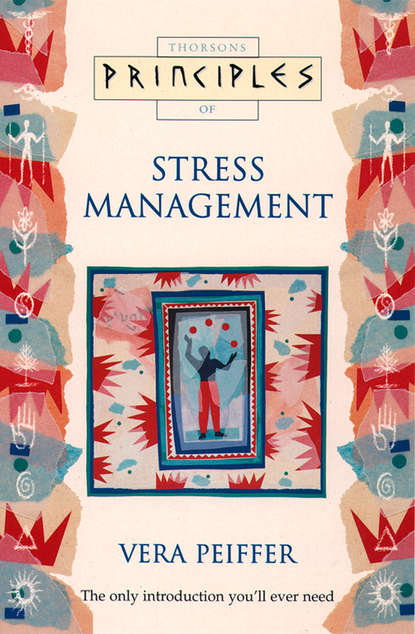По всем вопросам обращайтесь на: info@litportal.ru
(©) 2003-2025.
✖
Stress Management: The only introduction you’ll ever need
Автор
Год написания книги
2019
Настройки чтения
Размер шрифта
Высота строк
Поля
When I have made only one small mistake, I have to do the whole job again, no matter how trivial the job itself is.
As soon as I have accomplished one task, I start on the next one.
How many points did you get in each section?
If you have four or more points in any one category, you have a strong tendency towards that personality type.
Very few people are a ‘classic’ specimen of any of the four types, but knowing which of the four you are most similar to can give you a good starting point for understanding what is driving you and how you can make adjustments to reduce your stress levels.
4 (#ulink_55a37061-afe2-56fb-9bbc-a49a39246223)
WHAT IS CAUSING YOU STRESS? (#ulink_55a37061-afe2-56fb-9bbc-a49a39246223)
As mentioned in Chapter 1, there are of course many different causes of stress, and what is stressful to one person will not be to another. While it is beyond the scope of this book to describe all the possible causes of stress, this chapter outlines some of the most common culprits.
Stress is most commonly associated with a heavy workload or with having to shoulder great responsibility; the underlying cause of one’s reaction to stress may involve many other factors as well. Both home and the workplace can become the scene of many triggers for physical and mental tension which can gradually build up and, if left unchecked, can develop into a serious health risk.
WORK STRESSORS
The work environment is a veritable breeding ground for stress, for a variety of reasons. Wherever several people get together on a regular basis, tension becomes a possibility. Personalities can clash and roles within a group can be unclear and consequently adversely influence the effectiveness of the group as a whole. Rivalries often develop which lead to wranglings that have nothing to do with the job in hand, and general dissent about aims and procedures can mar the successful completion of an assignment or project.
Time pressure and deadlines are often part of a job, with projects having to be completed by a given date. In theory this should work well, provided everyone involved pulls his or her own weight. Unfortunately, things do not always run smoothly. Deadlines are sometimes set by people not directly involved in a project, which means they may be unreasonably tight, or even impossible to meet. The result? Everyone involved ends up feeling frustrated and angry.
Unless you work for yourself, most people have to report to someone in a higher position, and a lot of stress can arise if the boss is not a good leader or communicator. People are often promoted to leadership positions only on the strength of their professional skill and knowledge. Whereas they may have been excellent members of staff, they may not make very good heads of a department or sector. Very often, an inability to communicate effectively is at the root of the problem.
Then there are the difficult colleagues … Anyone who has ever worked with or for a difficult person will know how exhausting it can be. If there is friction between people in an office (be it open or implied) anger and resentment can fester, making you stressed out and, eventually, ill.
There are three main types of people who can create upheaval in the workplace – the Bully, who hassles anyone below him or her in the pecking order; the Backstabber, who has an inferiority complex and is nice to your face and puts you down when you have left the room; and the Shirker, who disappears whenever the going gets tough, leaving everyone else to sort out the problem. (We shall look at these three in more detail in Chapter 14.)
Unfortunately, women in particular are still often at the receiving end of bullying and harassment. Even though things have improved over the last few decades, woman are still not treated as equals in many work environments. Certain professions will only reluctantly allow women into their top ranks and, if they do, women still have to work doubly hard and are often paid less than their male counterparts. For the female employee, all this strain is often in addition to the responsibility of having to look after her family when she gets home in the evenings …
Stress can also evolve directly from your working environment. If you have to work with inadequate equipment this can affect you just as greatly as having to do a day’s typing on an uncomfortable chair that makes your back hurt so much you cannot concentrate after a while. Physical stressors can also include bad lighting, poor ventilation, and pollutants (such as cigarette smoke) in the air. An unpleasant or unsuitable environment can cause you not only to feel ill, but does little to boost morale among the members of the workforce who have to put up with it.
Then of course there is the situation of working on your own. It is a fairly modern phenomenon for people to run their own businesses from home or from modest office premises. It takes a dedicated and disciplined person to make working alone a success. You need to be highly motivated and have a strong sense of direction to get through the times when job-related matters do not progress as well as you would like them to, and when there is no one there to discuss things with you can easily end up feeling lonely and isolated.
DOMESTIC STRESSORS
As mentioned regarding work stressors, wherever there are people there is the possibility of stress. Just because at home the people around you are related to you does not mean that there are no power struggles going on!
An obvious cause of stress is disagreement or tension among family members. This can arise from a basic incompatibility between partners. When children are involved, an untenable marriage is often kept going in the belief that this will be better for the children. In reality, children suffer just as much, if not more, by living in a strained atmosphere at home than if they lived with one relatively happy parent.
Any instability in family life, be it rows or frequent absences of one partner, causes stress. Maybe one parent is away from home a lot because of business or the nature of his or her job, leaving the other to cope. Any decisions concerning the children have to be made by this parent, and in addition he or she has to shoulder all the responsibility if things do not work out and the children get into difficulties. With bullying, truancy and racism rife at many schools, and with the increased availability of drugs even in rural areas, it can be incredibly difficult – and stressful – bringing up children today.
If it is stressful to have healthy children, it is even more so when you have a child who is disabled or severely ill. Special children need help to do things which other youngsters can do unaided, and as there are only 24 hours in a day, loving parents will often end up neglecting themselves in the process. This can cause serious health problems for the parents, the stresses manifesting themselves both physically and mentally.
Of course, actual crises such as seeing your child or anyone else close to you die of an incurable disease or losing a baby through cot death are among the most tragic life situations you can be faced with.
But it is not just one’s immediate family who can be the cause of stress. What happens if your parents are no longer able to look after themselves, when they become too frail or unwell to run their own household? Some very difficult decisions have to be made, and these decisions are not only dependent on personalities but also on finances and circumstances. Considerable change is brought about by having one or two extra people in the house, people who have their own ways of doing things, their own habits and routines. This situation is not only stressful for the children, but also for the ageing parents who are trying to adapt to their new environment.
Today we understand that stress symptoms can also emerge when a family member has difficulties getting past a particular stage in the life cycle, such as becoming an adult, moving in with or marrying someone, becoming a parent, seeing the children leave home, and retirement. Each of these stages brings its own difficulties; people may find themselves having to adjust to their new role in life even as they work through letting go of the old one.
OTHER STRESSORS
Any changes that disrupt your daily routine are stressful to a greater or lesser extent, depending on your general disposition and circumstances. When you lose your job or find yourself in financial trouble for any other reason, this will cause great worry and concern – money problems have a direct knock-on effect on so many other matters in life.
Interestingly, even what we would consider to be positive changes can create stress, such as holidays or a promotion. The reason is that when you are taken out of your familiar home or work environment, you will automatically have to adjust to your new situation, and this involves the expenditure of extra mental energy, often coupled with a sense of anxiety.
Your immediate environment also has a great influence on your well-being. If you live in an isolated area (whether in a rural backwater or an anonymous block of flats), stress can be brought about by the fact that you have too little personal contact with other people.
Also, in areas where crime or violence are common, just leaving the house can be very stressful. Equally distressing are neighbours with antisocial habits who quarrel loudly or play their music at top volume in the middle of the night, just as any other form of noise pollution (say from nearby airports or factories) can disturb your sense of equilibrium and, therefore, invoke a stress reaction.
PART 2 (#ulink_875d7ed8-7685-5923-ab8e-800048ec47f7)
It is important to understand the warning signals that your body and mind send out in response to a physical or emotional overload. By acquainting yourself with these stress symptoms you will be able to recognize and deal with them quickly and effectively, before they get out of hand.
There are some warning signs that people readily associate with stress, such as excessive smoking, tiredness, headaches and irritability. But did you know that the habit of checking and re-checking whether you have locked your front door or turned off the cooker is also a symptom caused by stress? Or were you aware that a bad memory can be a sign of stress?
Understanding which form stress can take also gives you a better choice of how to combat it. You may decide that, rather than popping a pill when a tension headache crops up you will learn to relax more fully (page); that rather than taking sedatives for anxiety you will deal with what is causing the anxiety in the first place – this might involve becoming more assertive and being able to state your own needs more clearly (page).
5 (#ulink_6f15a767-eab9-549f-b80e-c705091eee58)
PHYSICAL REACTIONS (#ulink_6f15a767-eab9-549f-b80e-c705091eee58)
Our internal organs are controlled and regulated, without our conscious effort, by the autonomic (or vegetative) nervous system (ANS). The ANS consists of two antagonistic sets of nerves, the sympathetic and the parasympathetic nervous systems. The former connects the internal organs to the brain by spinal nerves; it prepares the organism for fight or flight when stress occurs. The nerve fibres of the parasympathetic nervous system, on the other hand, consist of cranial nerves and lumbar spinal nerves and have the task of getting the body back to normal after it has been aroused by the sympathetic nervous system.
This means that the sympathetic nervous system, once it is aroused, will set in motion a number of physical processes such as general muscle tension, dilation of the pupils, restriction of the flow of saliva in the mouth, dilation of the bronchi, opening of the pores and increased perspiration, constriction of the bowels and loosening of the bladder. In addition, the liver is activated to release sugar into the blood to produce extra energy, and hormones such as adrenalin and corticosteroids are pumped out into the system, accelerating breathing and increasing the heart rate. While all this is going on the autonomic nervous system slows down digestion processes.
Once the stress-inducing situation is over, the parasympathetic branch of the nervous system reverses all the above processes – the pupils contract again, saliva starts flowing freely once more, the bronchi contract, the heart rate slows down, the pores close, the bladder contracts and digestion is stimulated, as is the release of bile which helps digest fats.
To help you understand these physical processes we will take a look at a typical situation that produces some common stress symptoms.
SITUATION
You are worried about having to give a talk in front of a group of people. As you prepare for it, you become aware of the following physical reactions in yourself:
– your mouth goes dry and your voice becomes more high-pitched (flow of saliva restricted, muscles in throat tense)
– your heart beats faster and your breathing becomes irregular (chest muscles tense up and bronchi dilate, adrenalin is released)
– you need to go to the toilet to pass water more often than usual (bladder loosened)
– you are constipated or have stomach cramps (muscles tense up)
– your hands feel clammy (pores open and perspiration increases)
– you feel anxious and have ‘butterflies’ in your stomach (adrenalin is pumping through your system)
– you feel restless and pace up and down, your hands shaking and your knees trembling (blood sugar levels are up to provide more energy; adrenalin and corticosteroids accelerate body processes).







